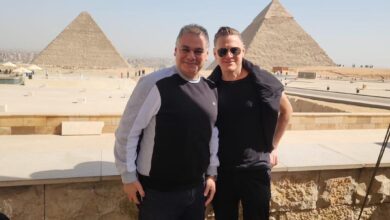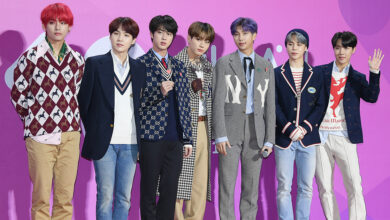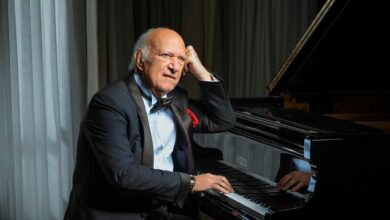Rula Zaki, a wedding and event singer, has finally gathered her work in an album to be released on Friday. This young talent, who is famous for winning second place in Egypt’s first Star Maker in 1993, presents a compilation of classic tunes redone with Arabic lyrics. It seems she has finally found a way to bring together her American education and Egyptian roots to create nine beautiful tracks that beg for black turtlenecks and long cigarette holders.
In some cases, the Arabic words are her own, though Zaki insists she is not a lyricist and says she would like to work with a number of lyricists on future albums. Despite her decision to rework tracks like "Besame Mucho" and "Ahwak, Ahwak" (Perhaps, Perhaps), Zaki eagerly anticipates the opportunity to work with lyricist and composer Khaled el-Bakry, and to sing original tracks on her next album.
The album is filled with lounge-style tracks, each showing a different side of Zaki’s full-bodied, beautiful voice. "Ghany Wayaya" (Sing With Me) is her wedding song, which she sings in a dreamier, softer tone. "Khatwa Khatwa" (Step by Step) is a tango that attests to Zaki’s extensive vocal range, while in "Khodni Maak" (Take Me With You), a remix of Besame Mucho, Zaki lets loose her vocal power. The album also contains a track called "Da Be Eino" (Exactly It) with lyrics by Antar Helal, with which Zaki tries to step into the mass market with a more Eastern feel.
Zaki has received a great amount of support for the project. Director/producer Tarek Nour gave Zaki rights to include her Star Maker song on the CD. Singer/lyricist Marwan Saada allowed her to add "Helwa Ya Baladi," based on their work together (Saada often asks Zaki to sing at his Opera House concerts). Nugoom FM has played her songs regularly, and "Albi Dak" was number one on their top seven chart for almost two months. Nonetheless, only a limited group of people may find her music interesting and despite the contribution her music can make to the local market, a lounge-listening niche market doesn’t promise as much in profits as the Arabic pop-loving masses.
Zaki settled on a distribution arrangement with Pyramedia, allowing her the exposure she has been seeking. But Zaki knows that exposure is probably the most she should expect out of the arrangement. "Piracy is rampant in Egypt," she says. "One of my songs was on the radio and the following day it appeared on the mix tapes sold at cassette kiosks around the city. The radio presenter’s intro was even recorded on the tapes with the song!" Zaki explains it is more likely for her songs to be purchased in formats like iTunes and as phone ringtones than as an actual CD.
Zaki’s reason for redoing the classics in Arabic is simple. "These songs are redone in French, in Spanish–and they are classic hits. I’ve always wanted to see them in Arabic." She adds that the few Spanish and English words thrown in (like the refrain in "Ahwak, Ahwak") are there to show Egypt’s linguistic range. "We are a cultured country. People in Egypt speak a number of languages and these songs should illustrate that," she says.
Despite such a strong need to represent classic hits in her mother tongue, Zaki is often berated for singing in English and for having a foreign accent when she sings in Arabic. But this should come as no surprise. Zaki speaks four languages and sings in 12. Her vocal training and education includes a bachelors of music from Lawrence University in the the United States and certification as an Early Childhood Music Specialist, as well as a license to teach Kindermusik. Zaki sings at events, teaches music, sings for commercials, and has played lead roles in the Arabic versions of Walt Disney’s Little Mermaid, Toy Story 2, and Cinderella.
Zaki’s future plans include exploring different genres of music and putting together songs with a lyricist and a composer for an album of originals. At some point, she would also like to plan a music video. She also refuses to make an entire album in the breathy, vibrating style that every recording studio has asked of her so far. "I can sing an emotional or romantic song with a softer tone," she explains, "but if the style calls for it, I can’t hold back my stronger, bolder tones."
Zaki has one other important plan: children’s music. She works at Cairo American College and teaches Kindermusik in 6th of October, but regrets the lack of new and creative Arabic songs for children.
Her nine-track album hits stores on Friday 12 February. Seven tracks are classic hits, redone in Arabic, one is Zaki singing "Helwa Ya Baladi" (Oh My Country, You Are Beautiful), originally sung by Dalida, and one is "Da Be Eino," a more Egyptian song. You can find out more at http://www.rulazaki.com/




